3 New Ozempic and Wegovy Side Effects

With 1 in 8 US adults having tried a GLP-1 drug like Ozempic or Mounjaro at some point and half of those currently using a prescription, approximately 15 million people are taking these drugs, according to a survey by KFF. With the popularity of these medications exploding, tracking side effects is more important than ever. New research published in JAMA shows that non-diabetics who take the drugs could experience serious and unpleasant side effects. Here's what those side effects are, plus others to expect from taking a GLP-1 drug.
Pancreatitis
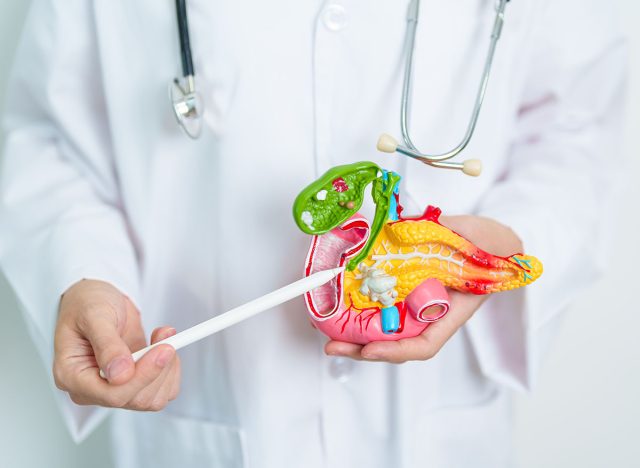
Non-diabetic users have a roughly nine times higher chance of developing pancreatitis. "It's definitely important that we're talking about this, but I want to keep it in perspective," Dr. Tara Narula tells TODAY. "These drugs have been around and treating diabetic patients for over ten years, and we've really known about a lot of these side effects, bowel obstruction, pancreatitis, in fact, many of them are on the labels for these drugs."
Bowel Obstruction
Non-diabetic users have a four times higher risk of a bowel obstruction. "But the absolute risks are small, so these are rare," Dr. Narula says. "We're talking about, for example, gastroparesis, which is this concept of slowing stomach emptying. We're talking about going from 0.3% with these non-GLP drugs to 1% with Ozempic, 0.3% to 0.8 or 0.7% with the other drugs. So these are small increases."
RELATED: What Happens to Your Body When You Stop Taking Ozempic
Stomach Paralysis

Non-diabetic users have a more than three-and-a-half times higher risk of stomach paralysis. "That's actually how this drug partially works, which is slowing the emptying of the stomach," Dr. Narula says. "So it helps you feel fuller longer. The problem is, in some people, if it is severe, you will end up with nausea, vomiting, abdominal pain, feeling full bloating. So it's important we're raising awareness, but we want to keep it in perspective."
No Off-Label Drugs

Dr. Narula makes it clear no one should be trying to get these drugs without going through a medical professional. "People should not be getting this drug off the internet," she says. "They should not be getting it without sitting down with a healthcare provider who can really talk to you about the risks and the benefits. Are you someone, for example, who has a history of bowel problems or pancreatitis? Then you probably shouldn't be taking this drug. Do the benefits outweigh? And yes, for obesity, we're talking about cardiovascular risks, cancer risks."
Take It Slow
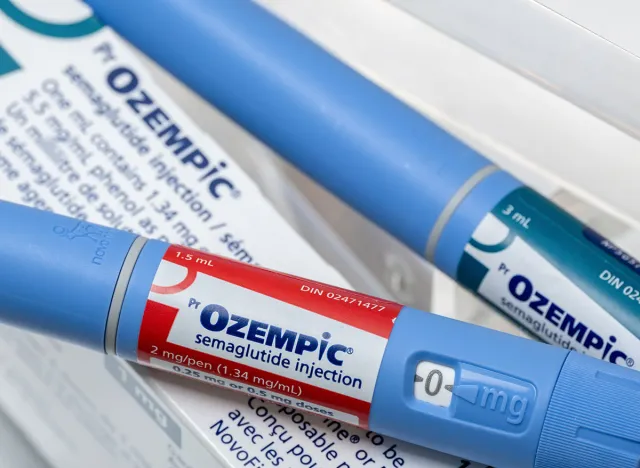
Dr. Narula recommends starting on a low dose and increasing if necessary. "For a lot of people, there is going to be a benefit here, but you really want to do it the right way in terms of starting these drugs. Start low; you don't increase it until four to six weeks. You monitor for side effects, and if you need to, you can lower the dose. This healthcare provider should be talking to you about non-GI risks as well."
There Are Benefits Too
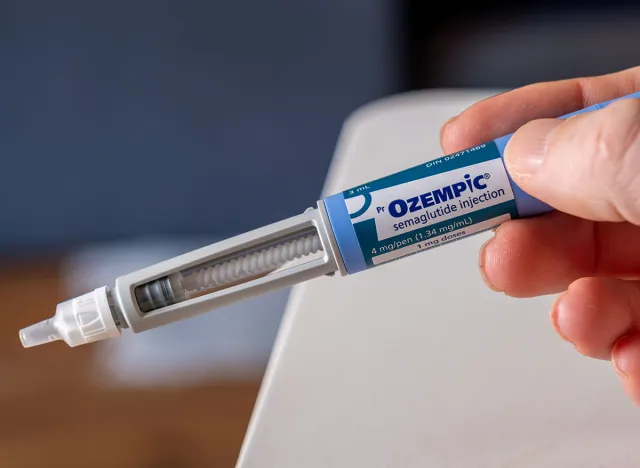
Dr. Narula says 40 to 60% of my patients are talking about GLP-1 drugs. "I mean, so many of my patients struggle with obesity, and many of them want to know about other options besides bariatric surgery and meeting with a nutritionist," she says. "They say I've tried everything, and I can't figure out a way to lose weight. And we know that with these medications, we are seeing benefits in a cardiovascular high-risk population for lowering the risk of heart attack and stroke. So there are benefits for those people. So it is important to talk to your doctor about it. It's not for everyone. It may be for you, but really have that conversation."
RELATED: 20 Things You Need to Know About Ozempic and Weight Loss
Vision Issues
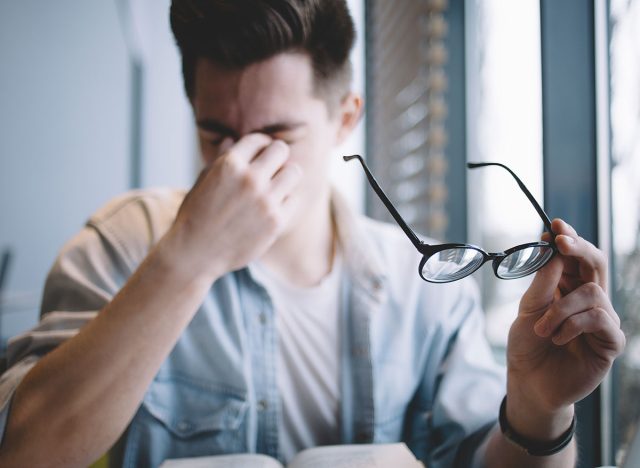
Ozempic and Wegovy may also cause several other side effects, like vision issues. "It may seem strange that a drug made to help control diabetes could make your eyesight worse, but it's something we've known about for a while," says Raj K Maturi, MD. "A large clinical study suggested that there is an association between blood sugar control and worsening of diabetic retinopathy."
Hypoglycemia
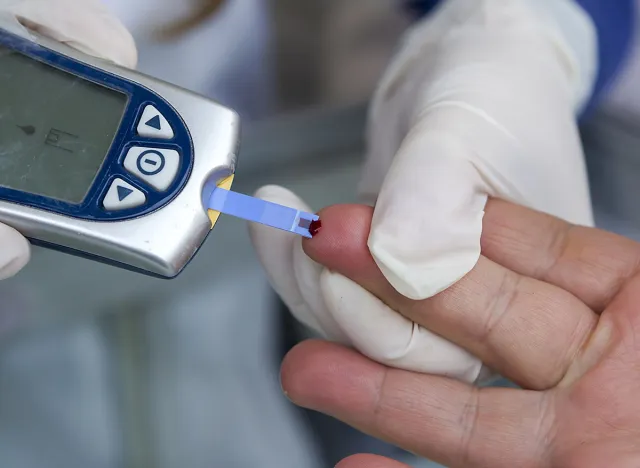
Ozempic may cause hypoglycemia in some people. "Signs and symptoms of low blood sugar may include dizziness or lightheadedness, blurred vision, anxiety, irritability or mood changes, sweating, slurred speech, hunger, confusion or drowsiness, shakiness, weakness, headache, fast heartbeat, and feeling jittery" Ozempic makers warn.
Gallbladder Issues

Some people taking GLP-1 drugs may experience gallbladder issues. "Given the wide use of these drugs, these adverse events, although rare, must be considered by patients who are contemplating using the drugs for weight loss because the risk-benefit calculus for this group might differ from that of those who use them for diabetes," according to research published in the Journal of the American Medical Association.
Thyroid Cancer
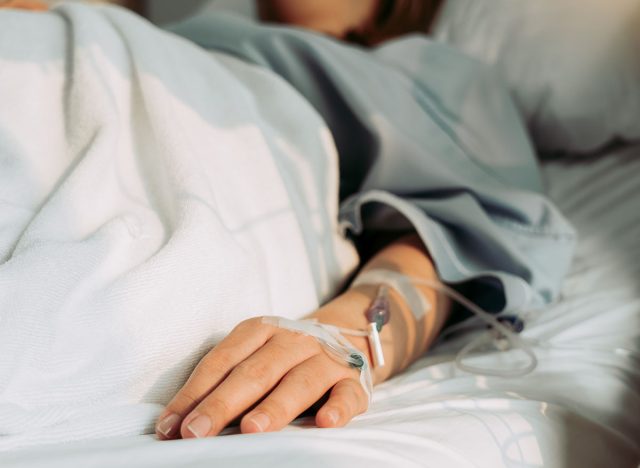
Ozempic may cause thyroid cancer, but a study shows no significant risk. "Our study covers a broad group of patients and provides strong support that GLP-1 analogs are not associated with an increased risk of thyroid cancer," Björn Pasternak, principal researcher at the Department of Medicine at Karolinska Institutet, said in a statement.
RELATED: 20 Possible Ozempic Side Effects
Ozempic Face
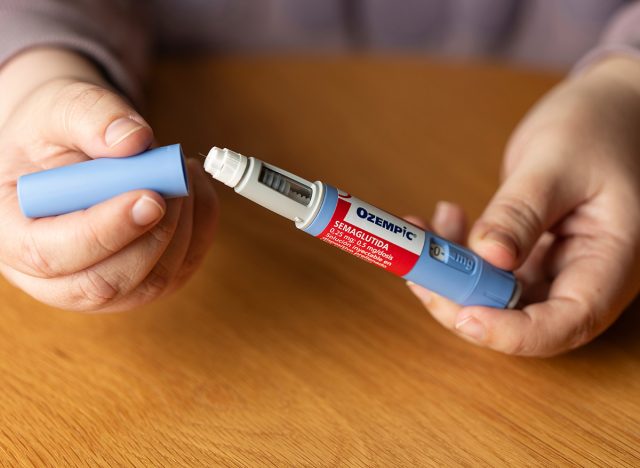
Fast weight loss may lead to a more hollowed-out look to the face, hence the term 'Ozempic Face'. "The term is misleading because this can be a side effect of any GLP-1 drug or any other cause of rapid weight loss," Lisa Catanese, ELS, says via Harvard Health. "If weight is lost in a more gradual way, these changes may not be as noticeable. It's the faster pace of weight loss that occurs with GLP-1 drugs that can make facial changes more obvious."
GI Issues

GLP-1 drugs may cause constipation and diarrhea. "Gradual dosing while on Ozempic is crucial to mitigate the risk of severe constipation associated with higher doses," Andrew Le, MD, tells Buoy Health. "Constipation caused by Ozempic usually subsides over time, with the median duration of constipation lasting 47 days."
Fatigue and Headache

Fatigue and headaches are also common side effects. "Gastrointestinal problems are the most common side effects since Wegovy can slow down people's digestive systems," Dr. Cecilia Low Wang, endocrinology, diabetes and metabolism expert, tells UC Health. "During clinical trials, some participants experienced nausea, diarrhea, vomiting, constipation, abdominal pain, headache, fatigue, indigestion, dizziness, bloating and gas."
RELATED: I Lost 10 Pounds in 30 Days With Walking and Eating Real Food
Severe Side Effects

Dr. Low Wang says side effects can be so severe some people stop taking the drug. "About one in five people might stop because they are experiencing bad side effects," she tells UC Health. "I encourage some patients to stay at the lower dose level for a longer period of time to see if they can tolerate it better and still get some benefit from the medication. Or if they don't tolerate this medication, we might try a different one." And if you enjoyed this article, don't miss 20 Incredible Ozempic Success Stories of All Time.




